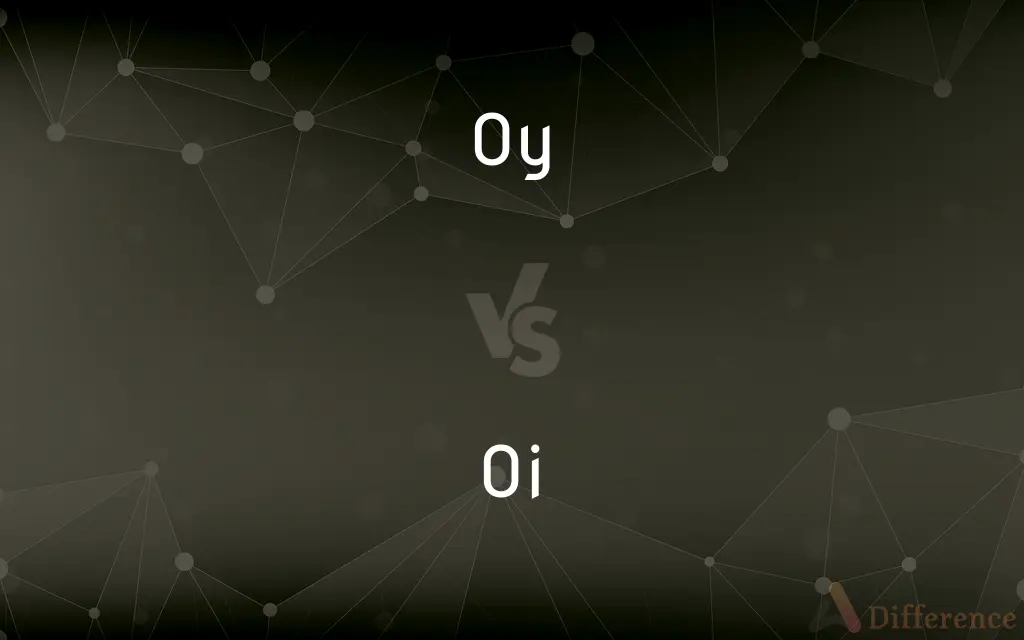Oy vs. Oi — What's the Difference?
Edited by Tayyaba Rehman — By Urooj Arif — Updated on March 18, 2024
Oy is an exclamation of dismay or annoyance, while oi is a British informal call for attention or to express surprise.

Difference Between Oy and Oi
Table of Contents
ADVERTISEMENT
Key Differences
Oy, often extended to "oy vey," has Yiddish origins and is used to express frustration, disappointment, or distress. Oi, on the other hand, is commonly used in British English as a call to grab someone's attention, akin to "hey" or "hi" in other English-speaking contexts.
The contexts in which oy and oi are used highlight their cultural distinctions. Oy is more likely to be used in a personal, introspective context, reflecting on a situation's distress or frustration. It's often more about expressing a personal feeling than directly addressing another person. Oi, by contrast, is outward-facing and used to initiate interaction with others, either to call someone out, signal a greeting, or express surprise at their actions.
In terms of tone and implication, oy tends to carry a more resigned or lamenting quality, indicating that the speaker is overwhelmed or burdened by some form of trouble. Oi, with its sharper, more abrupt sound, carries an edge of urgency or assertiveness, making it suitable for situations that require immediate attention or a quick reaction.
The phonetic and linguistic evolution of these expressions also underscores their cultural origins and how they've been adopted and adapted across English-speaking communities. Oy's journey from Yiddish into English reflects the blending of linguistic traditions, while oi's usage in British English and its spread to other English-speaking areas showcase the dynamics of language and culture.
Comparison Chart
Origin
Yiddish
British English
ADVERTISEMENT
Usage
Express dismay or annoyance
Call for attention or express surprise
Context
Personal, introspective
Interaction, confrontational
Tone
Resigned, lamenting
Urgent, assertive
Cultural Association
Jewish communities
British, especially Cockney English
Compare with Definitions
Oy
An exclamation of dismay.
Oy, I forgot my keys again!
Oi
Used to express surprise or shock.
Oi! That's my seat!
Oy
Reflects frustration or annoyance.
Oy, this is going to be a long day.
Oi
Can indicate irritation or annoyance.
Oi, stop that noise!
Oy
Used to express a range of distress.
Oy vey, what a mess!
Oi
A confrontational greeting.
Oi, what do you think you're doing?
Oy
Shows emotional exasperation.
Oy, that's enough noise for today.
Oi
A call to grab someone's attention.
Oi! Watch where you're going!
Oy
Can indicate being overwhelmed.
Oy, I can't believe this is happening.
Oi
Signals a demand or command.
Oi, come here a moment.
Oy
Used especially to express irritation, dismay, sorrow, or self-pity.
Oi
Used as a greeting or to attract someone's attention.
Oy
An exclamation typically expressing mild frustration or expressing feelings of uncertainty or concern.
Oi
Said to get someone's attention; hey.
Oi, you with the red hat – what do you think you're doing?
Oi! Stop that!
Oy
Alternative spelling of oi
Oi
An expression of surprise.
Oi! This is new!
Oi
An informal greeting, similar to hi.
Oi! How's it going?
Oi
Alternative spelling of oy
Oi
Alternative spelling of oy
Oi
A working-class punk rock subgenre of the 1970s, sometimes associated with racism.
Common Curiosities
Is "oi" used outside of the UK?
Yes, "oi" is used in other English-speaking countries, influenced by British culture and media, though it's most strongly associated with British English.
How have "oy" and "oi" spread beyond their original communities?
Through cultural exchanges, migration, and media, both expressions have been adopted by wider English-speaking audiences, adapting to new contexts and meanings.
Do "oy" and "oi" have similar expressions in other languages?
Many languages have their own versions of expressions to denote frustration, surprise, or to call attention, reflecting the universal nature of such emotions and interactions.
Can "oy" and "oi" be used interchangeably?
Due to their distinct origins and contexts, they are not generally interchangeable, as they convey different emotions and intentions.
Can "oi" be considered rude?
Depending on the tone and context, "oi" can be perceived as rude or aggressive, but it can also be used more neutrally as a way to get someone's attention.
Is "oy" exclusively used in Jewish communities?
While it originates from Yiddish and is strongly associated with Jewish culture, "oy" is used more broadly in English, especially in areas with diverse linguistic backgrounds.
Are there specific situations where "oy" is more appropriate than "oi"?
"Oy" is more appropriate in situations expressing personal dismay or frustration, while "oi" is suited for drawing attention or initiating interaction.
How does the tone of voice affect the meaning of "oi"?
The tone can dramatically alter its meaning, from a friendly call to a sharp reprimand, making it a versatile yet context-sensitive expression.
Why do some people prefer using "oy" or "oi" over more standard expressions?
These expressions can convey a nuanced range of emotions and cultural connections that more generic terms might not capture, offering a more vivid or authentic way to express feelings.
Has the use of "oy" and "oi" evolved over time?
Yes, as with many expressions, their usage and connotations have evolved, adapting to changes in society, culture, and language.
Share Your Discovery

Previous Comparison
Arsenal vs. Liverpool
Next Comparison
Jumper vs. DumperAuthor Spotlight
Written by
Urooj ArifUrooj is a skilled content writer at Ask Difference, known for her exceptional ability to simplify complex topics into engaging and informative content. With a passion for research and a flair for clear, concise writing, she consistently delivers articles that resonate with our diverse audience.
Edited by
Tayyaba RehmanTayyaba Rehman is a distinguished writer, currently serving as a primary contributor to askdifference.com. As a researcher in semantics and etymology, Tayyaba's passion for the complexity of languages and their distinctions has found a perfect home on the platform. Tayyaba delves into the intricacies of language, distinguishing between commonly confused words and phrases, thereby providing clarity for readers worldwide.
















































